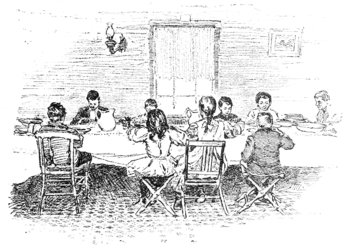was observed that Dover was always employed by the disaffected citizen, while Smith was in the service of authority, Engle being elected District Attorney, and now off on a case of forgery, Dover and Smith were the only two practising lawyers, and, naturally, rivals.
"Didn't the government offer to make good your loss?" asked Smith.
"Yes."
"Then why didn't you say so? What made you bring this suit, anyway?"
"Well, I didn't think they offered enough."
"What did they offer?"
"Well, they didn't exactly say."
"You were told that if you sued you could get bigger damages?"
"Yes."
"Who told you so, your lawyer?"
"Now, don't you git sassy," said Dover, who was standing by his client just outside the rail.
"Order, order," rapped the court.
"Your Honor," said Smith, "we will prove that an offer was made to the plaintiff the night the blankets were taken and he professed to be satisfied. I don't want anything more of you, Dugan."
Mrs. George was then sworn as the member of the Board of Health who took the blankets and had made the offer in question. Dover, with great courtesy, refused to cross-examine her.


Scenes in the Waldorf. The Fifteen-cent Lodgings (proprietor making bed); the Fifteen-cent Table.
The summing up was eloquent. Dover pictured the hardship of a contractor to make both ends meet the way things were carried on. Smith enlarged on the beneficence of a government which was not obliged by the terms of the contract to chase away midnight excursionists, but was only moved by the good of the citizens, yet had offered to make up the losses occasioned by the mishap of the fire.
Judge Moore was one of the older citizens, and had acquired that paternal manner and apparent comprehension of the follies and humors of human nature that are accounted among the personal attributes of the just judge. These were more especially brought out in another trial, for defamation of character: Grow vs. Jackson. The defendant had written a letter to the plaintiff, and her contention was that it had caused her to be laughed at and injurious remarks to be made about her. Under the skilful guidance of her lawyer, Smith, Citizen Grow told a moving tale of the discomforts she had suffered from the laughter and jeers, chiefly, it must be said, of her fellow-boarders at the Hotel Elmira. Jackson, a little fellow with dancing, bead-like black eyes, said he wasn't going to pay no lawyer; he could defend himself. He was permitted to cross-examine the plaintiff.
